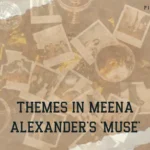Meena Alexander’s poem “Muse” intricately weaves a tapestry of themes that reflect on identity, displacement, memory, and the multifaceted nature of creativity.
As a piece of literature from a postcolonial perspective, it explores the complex intersections of personal and collective histories.

1. Displacement and Identity
One of the central themes in “Muse” is the sense of displacement and the quest for identity.
This theme reflects Alexander’s own experience as an immigrant, navigating multiple cultural identities. The poem captures the fragmented nature of identity through the lines:
“I write in English for my mother / who is silent in two languages.”
These lines illustrate the tension between different cultural identities. The poet writes in English, a language of colonial imposition, while her mother remains silent in her native languages.
This duality underscores the complexities of navigating identity in a postcolonial context, where language becomes both a barrier and a bridge.
2. The Intersection of the Personal and the Political
Alexander’s work often blurs the lines between the personal and the political, and “Muse” is no exception.
The poem reflects on the impact of political history on personal identity, with the muse representing a confluence of various cultural and historical forces. This is evident in the lines:
“This city, / the smear of human dust, the stars, the light / seeking the face of someone lost.”
Here, the “smear of human dust” and the search for a “lost” face point to the overarching theme of personal loss intertwined with historical displacement.
The city serves as a metaphor for a space of collective memory and loss, where personal and political histories converge.
3. Memory and Forgetting
Memory plays a crucial role in the poem, highlighting how the past is inextricably linked to the present. The muse embodies the act of remembering, serving as a guardian of memory. Alexander writes:
“The sky’s harbinger of forgetting, / a scattering of light that returns / bearing loss in its wake.”
This passage reflects on the ephemeral nature of memory and the inevitability of forgetting.
The “scattering of light” suggests moments of clarity amidst the chaos of recollection, where memories return but are tinged with a sense of loss.
4. Creativity and the Muse
The muse in the poem symbolizes the source of creative inspiration, yet it is depicted as elusive and multifaceted. This complexity is captured in the lines:
“Muse of our mortal thoughts / who walks the city at dusk.”
The muse is not a traditional source of inspiration; instead, it walks the city at dusk, embodying the transient and often melancholic nature of creativity.
This suggests that creative inspiration is drawn from the everyday experiences and struggles of life.
5. Transience and Permanence
The theme of transience versus permanence is explored through the imagery of the city and the muse.
The poem juxtaposes the fleeting nature of human existence with the enduring quality of art and memory. Alexander writes:
“In a single word I drown, / but in that drowning, I am found.”
This line speaks to the idea that through the ephemeral nature of words, there is a search for permanence.
The act of writing becomes a way to capture and immortalize fleeting moments of existence, even as they slip away.
6. The Role of Language
Language plays a pivotal role in the poem, serving as both a means of expression and a marker of cultural identity. The poem acknowledges the power of language to both connect and divide. This is evident in the line:
“Tongue tied, I mutter in the margin.”
The phrase “tongue tied” highlights the limitations and struggles of expressing oneself in a language that may not fully capture one’s cultural nuances.
Writing in the “margin” suggests a position of marginality, where the poet navigates the fringes of dominant cultural narratives.
7. Gender and the Muse
Alexander’s portrayal of the muse also touches on themes of gender and the role of women in the creative process.
The muse is depicted as a feminine figure who embodies the struggles and strengths of women. This is particularly evident in:
“You, Muse, who stands by the kitchen sink, / washing dishes, silent with your thoughts.”
Here, the muse is grounded in domesticity, reflecting the often overlooked but significant role of women’s labor and experiences in the realm of creativity.
The image of the muse at the kitchen sink challenges traditional notions of the muse as a distant, ethereal figure and instead places her in the context of everyday life and work.
Conclusion
In “Muse,” Meena Alexander explores a rich tapestry of themes that delve into the complexities of identity, displacement, memory, and creativity.
Through vivid imagery and poignant language, the poem captures the multifaceted nature of the muse and the intricate interplay between personal and collective histories.
The work stands as a testament to the power of poetry to navigate and articulate the profound experiences of individuals caught between cultures and histories.













